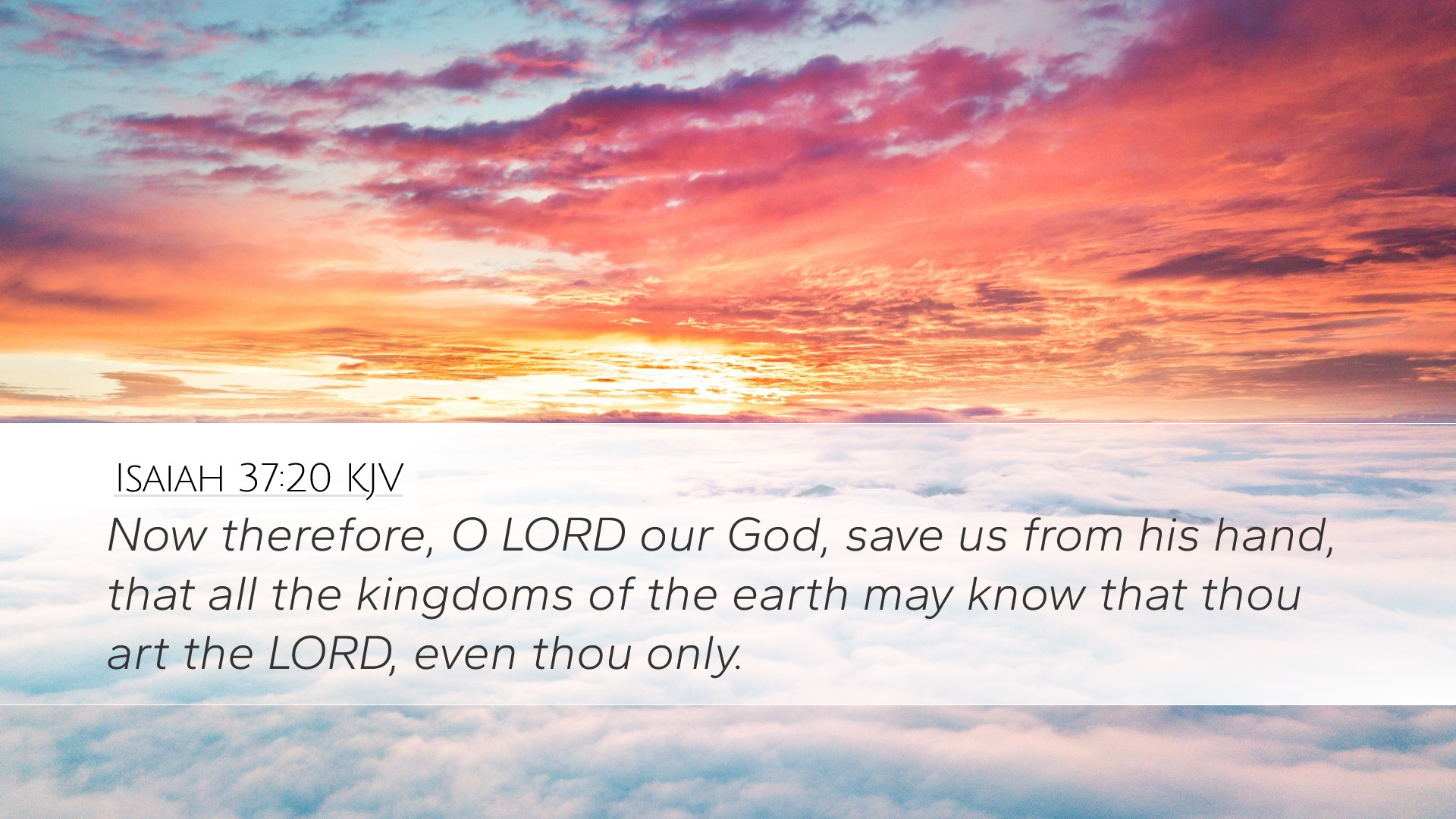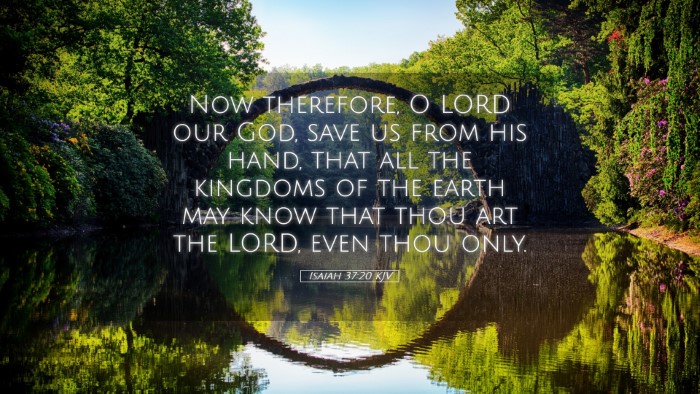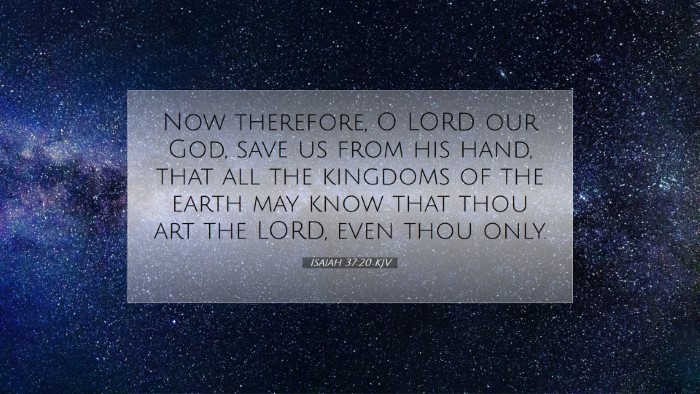Isaiah 37:20 - A Commentary
Text of the Verse: "Now therefore, O Lord our God, save us from his hand, that all the kingdoms of the earth may know that You alone, Lord, are God."
Introduction
Isaiah 37:20 captures a moment of profound desperation and faith. Ascribed to King Hezekiah, this prayer seeks divine intervention against the Assyrian threat. This verse not only reflects Hezekiah’s earnest supplication but also emphasizes God’s sovereignty and the ultimate purpose of His actions—for His name to be glorified among the nations.
Historical Context
During the reign of Hezekiah, the Assyrian Empire, under King Sennacherib, posed an existential threat to Judah. As the Assyrian forces laid siege to Jerusalem, Hezekiah faced overwhelming odds. His cry for help in this verse serves as an example of the spiritual leadership he provided during a crisis. Understanding the historical backdrop enhances our appreciation of his plea and the character of the God he addresses.
Verse Breakdown
“Now therefore, O Lord our God,”
This opening addresses God directly and emphasizes the covenant relationship between Yahweh and His people. Hezekiah acknowledges God's sovereignty and authority over Israel, recognizing that faith must be placed in the One who is both their protector and their God.
“save us from his hand,”
Hezekiah’s request is urgent and specific. His appeal for salvation from the Assyrian king is a recognition of human frailty in the face of powerful forces. In this context, “save” implies not merely a physical rescue but also spiritual deliverance, highlighting the comprehensive nature of God's salvific plans.
“that all the kingdoms of the earth may know,”
Hezekiah’s plea extends beyond personal or national needs; it seeks a global revelation. The king comprehends that the outcome of this confrontation has implications that stretch far beyond Judea. It underscores a missional aspect; God’s glory and renown are at stake. This aligns with the wider biblical narrative where God’s acts are aimed at making His name known among the nations.
“that You alone, Lord, are God.”
In this climactic declaration, Hezekiah asserts the exclusivity of Yahweh's sovereignty. This reinforces the central theme of the Shema—as found in Deuteronomy 6:4—illustrating that all nations must recognize the Lordship of God. The phrase “You alone” signifies that all other gods are false, a crucial point against the polytheistic backdrop of Assyria and its surrounding nations.
Theological Insights
God’s Sovereignty
This verse illustrates God as the ultimate ruler with authority over all the earth. Hezekiah’s petition reflects a deep understanding of God’s power in contrast to the futility of human endeavors and earthly kings. The sovereignty of God is magnified in His ability to deliver Israel despite formidable opposition.
The Nature of Prayer
Hezekiah models intercessory prayer, demonstrating vulnerability yet fortitude. Prayer is an act that acknowledges dependence on God. The sincerity of Hezekiah’s heart reveals a deep relationship with God, which is a foundation for effective prayer.
God’s Glory as Central Motive
The ultimate purpose of deliverance is not merely for Judah’s safety but for the wider acknowledgment of God’s supremacy among the nations. This serves as a reminder that believers’ prayers should encapsulate a desire for God's glory to be revealed in the world.
Commentary Insights
Matthew Henry's Perspective
Matthew Henry emphasizes that Hezekiah’s prayer reflects "the excellency of God’s power," showcasing it in the context of human weakness. He notes that God is to be sought earnestly as the only hook upon which hopes may hang in times of distress.
Albert Barnes’ Analysis
Albert Barnes points out the awareness of God’s reputation among the nations. He underscores the significance of prayer as both a personal plea and a communal acknowledgment of God’s right to reign. Barnes emphasizes the necessity of calling upon God when faced with difficulties and how such acts can display God's mighty hand.
Adam Clarke’s Commentary
Adam Clarke offers a rich analysis of Hezekiah's request, noting the depth of faith exhibited. Clarke states that Hezekiah understood that God’s help would not only lead to his salvation but also serve as a testimony to the earth. His insight underscores the anticipation of God's action as a means to glorify His name.
Applications for Today
- In Times of Crisis: This passage encourages believers to bring their petitions before God with faith, understanding His power to intervene.
- Understanding God’s Glory: Modern Christians are called to align their prayers and lives with God's glory. Our requests should echo the desire to showcase His greatness.
- The Role of Leadership: Hezekiah’s example serves as an encouragement for spiritual leaders to seek God’s guidance in communal crises and model reliance on divine strength.
Conclusion
Isaiah 37:20 is a profound testament to the power of prayer, the reality of God's sovereignty, and the ultimate aim of glorifying His name among the nations. As we study this verse, may we be inspired to approach God with the same fervor and understanding as Hezekiah, seeking His deliverance not just for our benefit, but for the honor and recognition of His greatness in the world.


